 Petzlover
Petzlover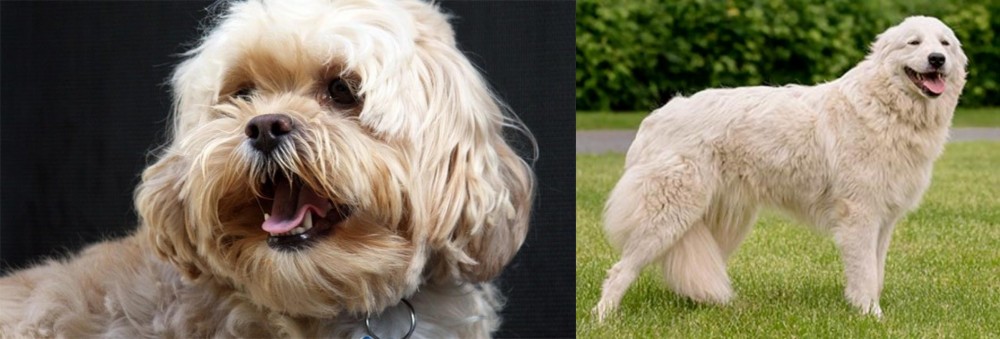 Lhasapoo is originated from United States but Maremma Sheepdog is originated from Italy. Lhasapoo may grow 45 cm / 17 inches shorter than Maremma Sheepdog. Lhasapoo may weigh 39 kg / 85 pounds lesser than Maremma Sheepdog. Both Lhasapoo and Maremma Sheepdog has almost same life span. Lhasapoo may have less litter size than Maremma Sheepdog. Both Lhasapoo and Maremma Sheepdog requires Moderate Maintenance.
Lhasapoo is originated from United States but Maremma Sheepdog is originated from Italy. Lhasapoo may grow 45 cm / 17 inches shorter than Maremma Sheepdog. Lhasapoo may weigh 39 kg / 85 pounds lesser than Maremma Sheepdog. Both Lhasapoo and Maremma Sheepdog has almost same life span. Lhasapoo may have less litter size than Maremma Sheepdog. Both Lhasapoo and Maremma Sheepdog requires Moderate Maintenance.
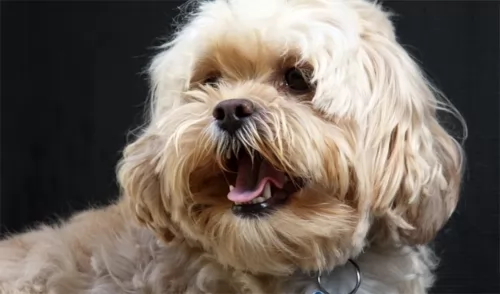 Such a cute, cuddly teddy bear of a dog is popular with everyone who just wants a wonderful canine companion.
Such a cute, cuddly teddy bear of a dog is popular with everyone who just wants a wonderful canine companion.
Both the Lhasa Apso and the Poodle are ancient dog breeds and they are the two breeds that have been used to bring about the Lhasapoo. The Poo has been bred to essentially be an indoor dog.
It would appear as though the Lhasapoo was developed in the United States of America, as in 1933, a pair was given to an American traveler who developed a kennel.
 Known also as the Cane de Pastore Maremmano-Abruzzese, the Maremma Sheepdog is often referred to as the Maremmano or the Abruzzese Sheepdog.
Known also as the Cane de Pastore Maremmano-Abruzzese, the Maremma Sheepdog is often referred to as the Maremmano or the Abruzzese Sheepdog.
This is a working dog – a guardian of sheep and an indigenous dog to central Italy. The dog has been used for centuries already to guard sheep.
It was in 1924 that the first standard for the breed was published.
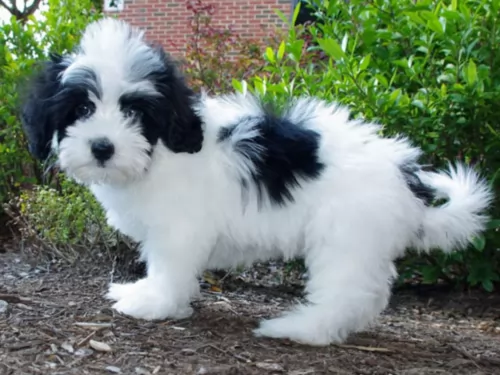 The Lhasapoo is a mix of Poodle and Lhasa Apso. He is a small dog standing between 25–28 cm in height and weighing 4 – 6kg.
The Lhasapoo is a mix of Poodle and Lhasa Apso. He is a small dog standing between 25–28 cm in height and weighing 4 – 6kg.
Known as a designer breed, his small size allows him to adapt to life in the city or to the countryside. He is such a cute little dog with his alert face, his bright brown eyes, short legs and floppy ears.
His coat is thick and dense and can be curly or fairly straight. It comes in a number of solid colors – apricot, tan, cream, brown, white and black or he can be bi-color – any of these colors mixed with white. In fact, as a crossbreed he can inherit the looks of either dogs – the Poodle or Lhasa Poo. Because he has poodle in him, these dogs are sometimes spoken about as being hypoallergenic.
Small and gentle in nature, the Lhasapoo makes a splendid pet and companion for everyone. He is such an amicable small dog, getting on well with both children and other pets in the home.
You can’t really tell what kind of a dog he’ll turn out to be in terms of his character, because he can be quite aloof if the Lhasa side of him is stronger or he could be playful and friendly if the Poodle side of him is stronger.
 The Maremma Sheepdog is a large dog with a muscular build. Some people who have owned these distinctive-looking dogs say he is like a big bear. He stands at 65 to 73 cm in height, both male and female, and he weighs 35 to 45 kg.
The Maremma Sheepdog is a large dog with a muscular build. Some people who have owned these distinctive-looking dogs say he is like a big bear. He stands at 65 to 73 cm in height, both male and female, and he weighs 35 to 45 kg.
The coat is long, thick and white with a dense undercoat. If you look you’ll see flashes of pale orange or apricot amid the white. There is thicker, longer hair around the neck area.
The nose is black, the eyes brown and the ears medium length and floppy. The long tail is set low and is thickly feathered. You can expect 6 – 10 puppies from these dogs.
The Maremma has always been used to guarding sheep, and today even though he is looked upon as a wonderful, friendly companion dog, he also makes an excellent watch dog, being brave and courageous. He isn’t the kind of dog that you think of as getting wildly excited over something, as he has a dignified aura about him.
He is an independent dog, so training and sociaization will be absolutely imperative as he is strong-willed and likes to do things his way. Once trained and socialized, it is amazing to see such a large dog obeying all your commands such as ‘lie down, come, sit an stay'. He is very intelligent and shouldn’t have any trouble learning these basic commands.
He is calm and gets on well with children as well as other pets in the home. With his role as guardian of sheep, he has learned to be loyal and patient and will make a loyal ad loving family pet he takes his role as guardian very seriously.
He loves hard work, and shepherds have always appreciated the splendid work he does guarding their flocks. As a companion you will also appreciate the many excellent qualities he possesses.
The Maremma Sheepdog isn’t recommended for life in the city where there is a tiny garden. He has always been accustomed to large open spaces and requires a large garden. He won’t tolerate heat well with that thick coat of his and will require a shady spot in your garden to retreat to.
 The Lhasapoo is a crossbreed, so you never know what you’re actually going to get – a little bit of Lhasa or a little bit of Poodle.
The Lhasapoo is a crossbreed, so you never know what you’re actually going to get – a little bit of Lhasa or a little bit of Poodle.
One thing is for sure though – you’re going to get the cutest little pet ever. He is a friendly, affectionate dog, but the Lhasa side of him makes him wary of strangers, making him an excellent watchdog.
They have a moderate activity levels and will adapt easily to life in the city or in the countryside, but they will need a walk every day to ensure he doesn’t become unfit and obese.
Lhasapoo puppies are adorable but every cute puppy grows into an adult. Then it’s time to show you’re a responsible dog owner by continuing to love and care for your adult Lhasapoo so that he becomes the wonderful companion he is designed to be.
 This is a beautiful dog, but large, so don’t make the mistake of wanting a large dog like this for his looks. He will be expensive to feed.
This is a beautiful dog, but large, so don’t make the mistake of wanting a large dog like this for his looks. He will be expensive to feed.
If you have the means to provide a good home for him, he is friendly and good natured, even though he is strong-willed and independent.
Provide him with a good home and you’ll have a most splendid pet and companion.
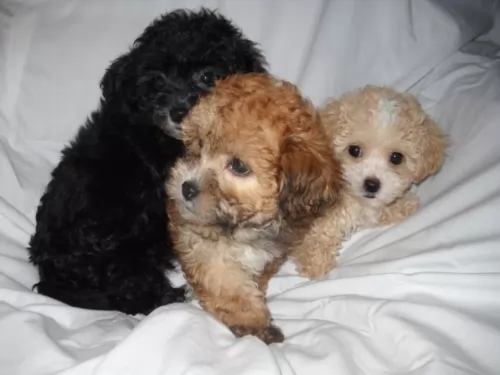 All dogs have the potential to become ill but when you give your dog the best chance to eat well and he is loved and cherished, he can live a long life.
All dogs have the potential to become ill but when you give your dog the best chance to eat well and he is loved and cherished, he can live a long life.
The Lhasapoo can live to be 15 years of age if you treat him well and ensure that he has a healthy diet. Of course as a crossbreed, his chances of developing inherited diseases is limited.
Watch out for Bloat, particularly if your pet gobbles up a large bowl of food. It is better to feed him 2 smaller meals a day. There are some time-releasing food bowls available for pets to encourage slower eating.
With Bloat, you’ll notice your pet’s stomach is swollen up. Complications set in when the stomach turns or twists as fluid and air can’t escape. Your dog will also be restless, drooling and trying to vomit. Bloat is a life-threatening illness.
This can be a complication from disease or medications even. It is important to keep your pet’s teeth healthy as chronic kidney disease can be caused by dental disease too. Bacteria from the diseased teeth and gums enters bloodstream and damages vital organs like the kidneys.
 This ancient dog breed is robust and can reach 11 to 13 years of age when cared for properly. Like any other dogs, he can be prone to certain health problems.
This ancient dog breed is robust and can reach 11 to 13 years of age when cared for properly. Like any other dogs, he can be prone to certain health problems.
One of these is hip dysplasia. Preventing your dog from becoming overweight can work towards preventing these kinds of musculoskeletal issues. Hip dysplasia occurs when your dog’s hip joints don’t develop properly so that the hips partially dislocate.
It is painful for your dog and it can be debilitating, leading to arthritis too and making it difficult for your pet to get around and to get up from lying down. There are a number of treatment options offered by your vet.
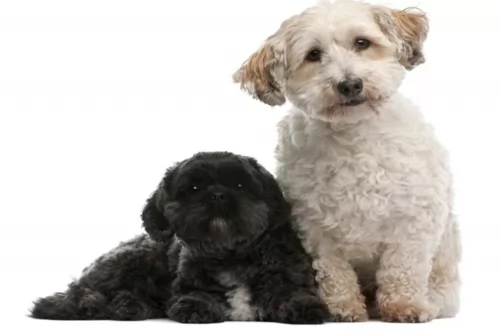 The Lhasapoo is a dog breed that likes to spend time indoors. Because of his looks, his human family members will no doubt be vying for his attention and playing indoor games with him. It will do him good to get out for a walk every day as this gives him the chance to sniff around and smell different things and experience life outside his home.
The Lhasapoo is a dog breed that likes to spend time indoors. Because of his looks, his human family members will no doubt be vying for his attention and playing indoor games with him. It will do him good to get out for a walk every day as this gives him the chance to sniff around and smell different things and experience life outside his home.
The Lhasapoo isn’t a big eater and he will require top quality food for small breeds. He isn’t a big meat eater so a tiny bit of cooked chicken, rice and vegetables chopped up nicely and added to his kibble from time to time will keep him healthy and happy.
Being the crossbreed that he is, you can’t be too sure about the type of coat your Lhasapoo will have. It can be curly, wavy or straight. Most inherit curls.
A Lhasapoo coat looks wonderful when it has been professionally groomed, and then in between grooming, his coat will need to be brushed to prevent tangling. While you’re brushing him, check his eyes too. Sometimes he can develop tear stains beneath the eyes and you can wipe gently around his eyes.
Other grooming for your cute little dog includes having his nails clipped as well as checking inside the ears for infection. Excess wax and dirt can result in an ear infection. You’ll notice your pet shaking his head, the insides of his ears might be red and he wants to scratch his ears. Get him to the vet who will show you how to keep his ears clean and dry.
Also, brush his teeth with special canine toothbrush and toothpaste. Dental disease won’t only damage his teeth, it can cause problems with other parts of the body too.
 As already suggested, this large dog will need space and he will need to be exercised. Apart from long walks in he countryside or in the park or your neighborhood, he will also need other activities that stimulate him mentally and physically.
As already suggested, this large dog will need space and he will need to be exercised. Apart from long walks in he countryside or in the park or your neighborhood, he will also need other activities that stimulate him mentally and physically.
The thick, all-weather coat of the Maremma will need a thorough bushing at least twice a week to get rid of all those loose hairs. When you are brushing him, look around for signs of ticks and fleas too and run your hands over him to feel for any unusual lumps.
The Maremma is a large-breed dog, so before you get a big dog like this, decide whether you have the financial means to feed him and look after him properly. He is going to cost a lot to feed, so think it through first.
He will need to be fed a high-quality commercial dog food which has been specially formulated for a dog of his size. Keep the food of dogs simple. We’re all tempted to feed our dog treats like things such as chocolates, coffee, nuts, onions, grapes and raisins but these can cause havoc with your dog’s stomach.
Stick to simple, nutritious food. Boiled chicken, brown rice or pasta and vegetables such as potatoes, spinach and carrots can do wonders for your pet when you sometimes mix this into his kibble.
Try and mix some raw meat into his diet occasionally. Make sure he always has access to fresh, cool water.